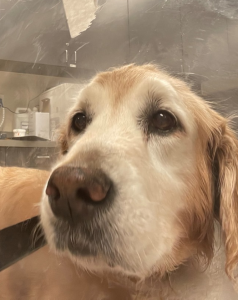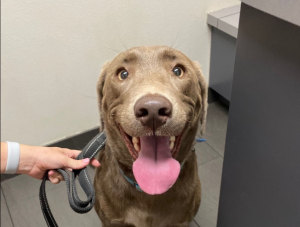Canine Cognitive Dysfunction
— download print-friendly version here —
— By Dr. Emily Adamson —
Did you know that dogs are generally considered “seniors” at seven years of age? The old adage that one dog year equals seven human years isn’t too far off. There are changes that can be expected as a dog ages – osteoarthritis, dental disease, hearing loss – and your veterinarian is the best resource to navigate these changes to help make your dog’s senior years as happy and comfortable as possible.

Your pet’s needs will change as they enter their senior years!
However, there are some changes associated with aging that are actually considered pathologic and part of a clinical syndrome known as “Cognitive Dysfunction Syndrome”, or CDS.
CDS can affect both dogs and cats, but for the purpose of this article, dogs will be the primary focus. Comparisons between CDS and Alzheimer’s disease in humans show that many of the changes at the cellular level in the brain are similar between the two, so you might have heard CDS referred to as “Dog Alzheimer’s.”
The signs of CDS can be summarized by the acronym “DISHAA”:
- DI – Disorientation
- S – Sleep/wake cycle disturbances
- H – House soiling
- A – Activity changes
- A – Anxiety
Many owners will notice changes as their dog ages that indicate CDS — the most commonly reported are:

Is your pet’s behavior consistent with CDS?
- Trouble sleeping
- Pacing (especially at night)
- Vocalizing inappropriately (howling or crying suddenly, especially at night)
- Staring off into space
- Getting stuck in corners or areas of the house that were previously navigated normally
- Having accidents in the house
These changes were previously thought of as “normal” age-related changes, but now we know that they indicate a disease process that can, in many cases, be addressed by your veterinarian.
What You Can Do to Lessen Symptoms of CDS in Dogs
When a dog is experiencing changes associated with CDS, a variety of environmental changes can be made to alleviate their symptoms. For example, keeping a predictable routine can help lower anxiety, maintaining furniture positioning in the house can reduce disorientation, and encouraging frequent trips outside or introducing soiling pads can decrease the frequency of accidents in the house. There are also dietary supplements and prescription diets that have been shown to reduce symptoms or slow the progression of CDS.
How Your Veterinarian Can Help Your Dog with Cognitive Dysfunction Syndrome
Lastly, there are some medications that have been shown to reduce symptoms of CDS as well — some are targeted specifically to CDS, and some are general anti-anxiety medications that can be added to help improve the quality of life of a dog (or cat) in early or late stages of cognitive dysfunction. Your veterinarian is the best resource to evaluate your pet for CDS and determine what treatment tools will benefit your pet and improve their quality of life.

Schedule annual exams and testing for your pet!
Having a senior pet certainly comes with its share of challenges, and the best way to navigate these is to have routine physical exams and diagnostic testing performed (especially after seven years of age). Metro Paws Animal Hospital offers a Senior Wellness Package for all pets receiving annual vaccines, which includes a broad bloodwork panel to evaluate internal organ function and full body X-rays to screen for problems that may appear on an X-ray before your pet is showing outward symptoms.
If you suspect your pet is experiencing symptoms of CDS, diagnostic testing will be recommended to rule out any other potential causes (such as metabolic diseases that cause increased urination, etc.) before treatments for CDS can be explored. Here is an excellent tool for evaluating your pet for possible cognitive dysfunction—free to bring this assessment to your veterinary appointment if you are worried about CDS. Although CDS currently does not have a “treatment” or cure, there are many things you and your veterinarian can do to ensure your pet’s quality of life remains as high as possible well into their senior years.
If you’d like to have your senior dog evaluated for CDS or have them seen for any other concerns, contact us today.
